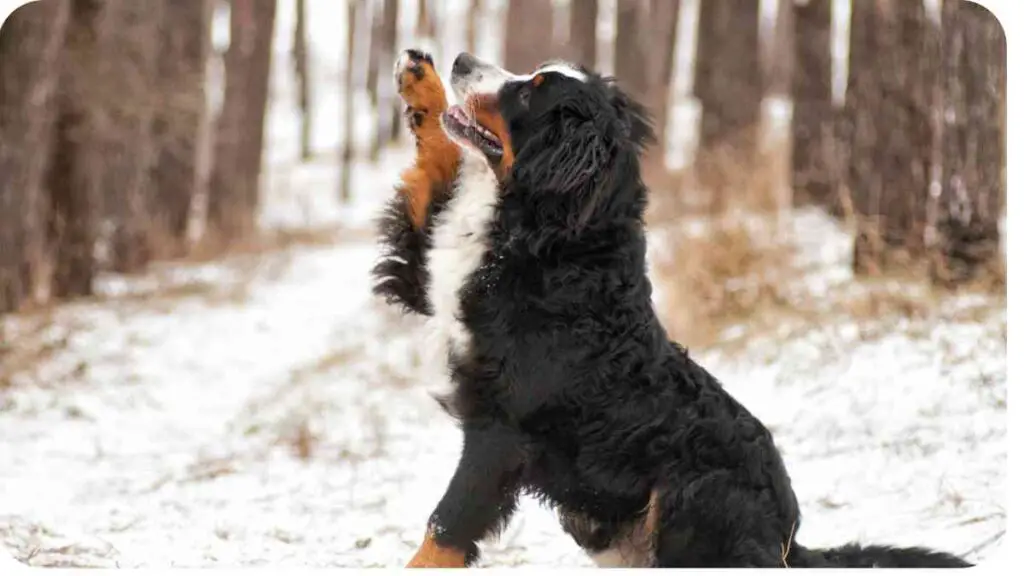Hey there, dog lovers! Today, we’re diving into the wonderful world of Bernese Mountain Dogs. These gentle giants are not just beautiful; they’re also loyal companions with hearts as big as their fluffy bodies.
If you’re considering bringing one into your family or already have a Bernese buddy, this guide is for you. We’ll cover everything from their lifespan and health to daily care and training. Ready to become a Bernese expert?
| Key Takeaways |
|---|
| Bernese Mountain Dogs are loyal, gentle giants with a striking tricolor coat. |
| Their average lifespan ranges from 7 to 10 years, influenced by genetics, diet, and health care. |
| Common health issues include hip and elbow dysplasia, cancer, heart disease, and bloat. |
| Regular vet checkups, a balanced diet, and consistent exercise are crucial for their well-being. |
| Grooming needs include weekly brushing, monthly nail trimming, and occasional baths. |
| Mental stimulation and socialization are important for keeping them happy and well-rounded. |
| Preventive measures such as vaccinations and parasite control are essential for their health. |
| Senior Bernese Mountain Dogs may need adjustments in diet and exercise to accommodate aging. |
Understanding the Bernese Mountain Dog

Breed Overview
The Bernese Mountain Dog, affectionately known as the Berner, is a large, sturdy breed originating from the Swiss Alps. These dogs are known for their striking tricolor coats—black, white, and rust—that make them stand out in any crowd. With their sweet nature and calm demeanor, Berners are perfect family pets.
Ensuring your Bernese Mountain Dog gets the best nutrition is crucial. For a guide on choosing suitable food for similar large breeds, check out Best Food for Alsatian Dogs to maintain their health and energy levels.
History and Origins
Bernese Mountain Dogs have a rich history dating back to Roman times. Originally used as farm dogs in Switzerland, they excelled at herding cattle, pulling carts, and guarding farms. Their versatility and hardworking nature made them invaluable to Swiss farmers.
Physical Characteristics
Berners are large dogs, with males weighing between 85 to 115 pounds and females ranging from 70 to 95 pounds. They have a thick double coat that requires regular grooming to keep it looking its best. Their expressive eyes and gentle demeanor make them irresistible to dog lovers everywhere.
Bernese Mountain Dog Lifespan

Average Lifespan
One of the most common questions about Bernese Mountain Dogs is their lifespan. On average, Berners live between 7 to 10 years. While this may seem short compared to other breeds, understanding the factors that affect their lifespan can help you provide the best care possible.
Addressing health issues effectively can prolong your Bernese Mountain Dog’s life. Learn more about managing common conditions by reading How to Treat a Yeast Infection on Your Dog’s Paw, which provides essential care tips.
Factors Affecting Lifespan
Several factors can influence a Bernese Mountain Dog’s lifespan, including genetics, diet, exercise, and overall health care. Regular vet checkups and a healthy lifestyle can significantly contribute to a longer, happier life for your furry friend.
Common Health Issues
Hip and Elbow Dysplasia
Bernese Mountain Dogs are prone to hip and elbow dysplasia, conditions where the joints develop abnormally. This can lead to pain and mobility issues. Regular vet checkups and maintaining a healthy weight can help manage and prevent these conditions.
Cancer
Unfortunately, Bernese Mountain Dogs have a higher incidence of cancer compared to other breeds. Types like histiocytosis and lymphoma are particularly common. Early detection through regular vet visits can make a significant difference in treatment outcomes.
Heart Disease
Heart disease, including dilated cardiomyopathy, can affect Berners. Symptoms may include fatigue, coughing, and difficulty breathing. Regular heart screenings can help detect and manage these conditions early.
Bloat
Bloat, or gastric torsion, is a life-threatening condition that can affect Bernese Mountain Dogs. It occurs when the stomach twists, trapping gas and causing severe pain. Immediate veterinary attention is crucial if bloat is suspected.
Daily Care and Maintenance
Diet and Nutrition
A balanced diet is essential for your Bernese Mountain Dog’s health. High-quality dog food with the right mix of protein, fat, and carbohydrates will keep your Berner in top shape. Consult your vet to determine the best diet plan for your dog’s specific needs.
Heartworms are a serious concern for large breeds. Ensure your Bernese Mountain Dog is protected by understanding prevention and treatment options in Effective Treatments for Heartworms in Dogs, which details necessary interventions.
Exercise Needs
Berners are active dogs that require regular exercise to stay healthy and happy. Daily walks, playtime, and mental stimulation are vital. Without enough exercise, they can become bored and develop behavioral issues.
Grooming Requirements
Grooming a Bernese Mountain Dog can be a bit of a challenge due to their thick double coat. Regular brushing, at least once a week, is necessary to prevent matting and reduce shedding. Bathing should be done as needed, usually every couple of months.
Mental Stimulation
Berners are intelligent dogs that thrive on mental challenges. Training sessions, puzzle toys, and interactive games can help keep their minds sharp and prevent boredom.
Training Your Bernese Mountain Dog

Basic Commands
Teaching your Berner basic commands like sit, stay, and come is essential for their safety and your sanity. Positive reinforcement methods work best with this breed, as they respond well to praise and treats.
Keeping your Bernese Mountain Dog active is vital for their well-being. Discover effective ways to engage them with the right equipment in Best Ball Throwers for Active Dogs, ensuring they stay fit and happy.
Socialization
Socializing your Bernese Mountain Dog from a young age is crucial. Expose them to different people, places, and other animals to ensure they grow up to be well-rounded and confident adults.
Advanced Training
Once your Berner has mastered the basics, you can move on to more advanced training. Agility courses and advanced obedience classes can be a great way to challenge them both physically and mentally.
Preventive Health Measures
Regular Vet Checkups
Regular vet checkups are a must for your Bernese Mountain Dog. These visits allow for early detection of potential health issues and ensure your dog is up-to-date on vaccinations and parasite control.
Vaccinations
Keeping your Berner’s vaccinations up-to-date is essential for preventing serious diseases. Work with your vet to create a vaccination schedule that suits your dog’s lifestyle and health needs.
Parasite Control
Parasite control is crucial for keeping your Bernese Mountain Dog healthy. Regular treatments for fleas, ticks, and worms will help prevent infestations and related health problems.
Special Care for Senior Bernese Mountain Dogs
Adjusting Diet
As your Bernese Mountain Dog ages, their dietary needs will change. Older dogs may require fewer calories and more joint-supporting nutrients. Consult your vet for the best diet plan for your senior Berner.
Moderate Exercise
While exercise is still important for senior dogs, it’s essential to adjust the intensity and duration to suit their aging bodies. Gentle walks and low-impact activities are ideal for keeping them active without overexertion.
Regular Health Screenings
Regular health screenings become even more important as your dog ages. Early detection of age-related issues can lead to more effective treatment and a better quality of life for your senior Berner.
Exploring different breeds and mixes can provide useful insights into dog care. Learn about the unique needs and characteristics of various dogs in Meet the German Shepherd Poodle Mix, which offers valuable information on hybrid breeds.
Creating a Safe Environment
Home Safety Tips
Creating a safe environment for your Bernese Mountain Dog is essential. Remove potential hazards, secure trash cans, and provide a comfortable sleeping area to ensure their safety and well-being.
Outdoor Safety
When outside, always supervise your Berner to prevent accidents and ensure they stay within a safe area. A fenced yard is ideal, but regular walks and on-leash playtime can also keep them safe.
Nutrition Table for Bernese Mountain Dogs
| Age Group | Protein (%) | Fat (%) | Calories per Day |
|---|---|---|---|
| Puppy (up to 1 year) | 22-28 | 12-18 | 1200-1500 |
| Adult (1-7 years) | 18-22 | 8-12 | 1500-2000 |
| Senior (7+ years) | 18-22 | 8-12 | 1200-1500 |
Exercise Routine Table
| Activity | Frequency | Duration | Notes |
|---|---|---|---|
| Daily Walks | Twice daily | 30-45 minutes each | Moderate pace, varied routes |
| Playtime | Daily | 15-30 minutes | Fetch, tug-of-war, supervised outdoor play |
| Mental Stimulation | 3-4 times a week | 15-20 minutes | Puzzle toys, obedience training, agility drills |
| Social Outings | Weekly | 1-2 hours | Dog parks, playdates with other dogs |
| Rest Days | As needed | Full day | Light activity, focus on mental exercises |
Grooming Schedule Table
| Grooming Task | Frequency | Tools Needed | Notes |
|---|---|---|---|
| Brushing | Weekly | Slicker brush, comb | Prevents matting, reduces shedding |
| Bathing | Every 2-3 months | Dog shampoo, conditioner | Keep coat clean, avoid overbathing |
| Nail Trimming | Monthly | Dog nail clippers or grinder | Prevents overgrowth, ensures comfortable walking |
| Ear Cleaning | Weekly | Ear cleaner, cotton balls | Prevents infections, check for signs of irritation |
| Teeth Brushing | 2-3 times a week | Dog toothbrush, toothpaste | Promotes dental health, prevents tartar buildup |
Common Health Issue Prevention Table
| Health Issue | Prevention Tips | Regular Checkups |
|---|---|---|
| Hip and Elbow Dysplasia | Maintain healthy weight, provide joint supplements | Annual x-rays, vet visits |
| Cancer | Regular vet checkups, early detection, healthy diet | Bi-annual checkups |
| Heart Disease | Healthy diet, regular exercise, avoid obesity | Annual heart screenings |
| Bloat | Feed smaller, frequent meals, avoid vigorous exercise post-meal | Emergency vet care if suspected |
Conclusion
Bringing a Bernese Mountain Dog into your life is a rewarding experience. These lovable giants are known for their loyalty, gentle nature, and beautiful tricolor coats. While they require dedicated care, from grooming to health maintenance, the bond you’ll form with your Berner is priceless. By understanding their lifespan, common health issues, and daily needs, you can ensure your furry friend enjoys a long, happy, and healthy life.
Further Reading
- “The Complete Guide to Bernese Mountain Dogs” by Andrea Brown Berman: An in-depth look at caring for, training, and loving Bernese Mountain Dogs.
- “Bernese Mountain Dogs For Dummies” by Terry Anne Barber: A practical guide for first-time owners.
- “Canine Nutrigenomics” by W. Jean Dodds and Diana Laverdure: Explores the science of dog nutrition and how it can prevent health issues.
FAQs
1. How long do Bernese Mountain Dogs typically live?
Bernese Mountain Dogs typically live between 7 to 10 years. Their lifespan can be influenced by genetics, diet, exercise, and overall health care.
2. What are the common health issues in Bernese Mountain Dogs?
Common health issues include hip and elbow dysplasia, cancer, heart disease, and bloat. Regular vet checkups and preventive care can help manage these conditions.
3. How much exercise does a Bernese Mountain Dog need?
Bernese Mountain Dogs need regular exercise, including daily walks and playtime. They thrive on mental stimulation and activities that challenge their intelligence.
4. What is the best diet for a Bernese Mountain Dog?
A balanced diet with high-quality dog food that includes the right mix of protein, fat, and carbohydrates is essential. Consult your vet for a diet plan tailored to your dog’s needs.
5. How often should I groom my Bernese Mountain Dog?
Regular grooming is crucial due to their thick double coat. Weekly brushing, monthly nail trimming, and occasional baths are recommended to keep your Berner looking and feeling great.
Further Reading
PetMD – Bernese Mountain Dog Breed Information
A comprehensive guide on the Bernese Mountain Dog, including details on their physical traits, temperament, and health considerations.
WebMD – What to Know About Bernese Mountain Dogs
An informative article on the Bernese Mountain Dog, covering their care requirements, common health issues, and tips for potential owners.
DogTime – Bernese Mountain Dogs: Short Lifespan
This article explores the typical lifespan of Bernese Mountain Dogs and factors contributing to their shorter life expectancy.
FAQs
What is the average lifespan of a Bernese Mountain Dog?
Bernese Mountain Dogs typically live between 7 to 10 years. Their lifespan can be influenced by factors such as genetics, diet, exercise, and overall health care.
What are the common health issues that affect Bernese Mountain Dogs?
Common health issues include hip and elbow dysplasia, cancer, heart disease, and bloat. Regular vet checkups and a healthy lifestyle are essential for managing these conditions.
How much exercise does a Bernese Mountain Dog need?
Bernese Mountain Dogs require daily exercise, including regular walks and playtime. They also benefit from mental stimulation through interactive games and training.
What should I include in my Bernese Mountain Dog’s diet?
A balanced diet with high-quality dog food is crucial. It should contain the right mix of protein, fat, and carbohydrates. Consult your vet for a diet plan tailored to your dog’s specific needs.
How often should I groom my Bernese Mountain Dog?
Bernese Mountain Dogs need regular grooming due to their thick double coat. Brush them weekly, trim their nails monthly, and bathe them every 2-3 months to keep them healthy and comfortable.

I am Dr Hellen James a veterinarian, pet lover, and writer. I have many years of experience caring for pets, including dogs, cats, birds, and fish (and even axolotls!). I love spending time with the animals in my life, especially when they are sick or need love.

